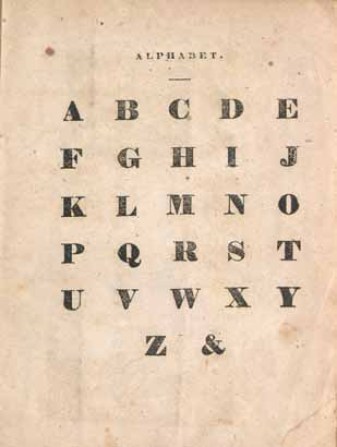Can you name the 27th letter of the alphabet?
Well, of course not, there are only 26 letters in the alphabet.
 But not always; once there were 27. (Well, 29, but we’ll get to that later.)
But not always; once there were 27. (Well, 29, but we’ll get to that later.)
The letter we’re talking about here is the ampersand: today it’s mainly used in company names, like Barnes & Noble, or in abbreviations like R&R.
It’s an unusual little critter. Where did it come from?
In the first century, Roman scribes wrote in cursive text, so when they wrote ‘et’ – the Latin word for ‘and’ – they linked the two letters. Over time, this was adopted in the English language as well. ‘And’ became both a word and a letter.
The name for this symbol – “ampersand” – came centuries later. In the early nineteenth century, school children reciting the alphabet still finished with ‘&’.
But you can’t finish ‘X,Y, Z, and.’ How could they sing that on Sesame Street? It doesn’t rhyme.
So instead, they said – because this is oh so much easier – ‘X, Y, Z and, per se, and.’
 Per se, in Latin, means ‘by itself.’ So the students, or the Muppets, or whoever, were actually singing: ‘X, Y, Z and, by itself, “and.” ’ (Wouldn’t you have loved to have been in kindy back then?)
Per se, in Latin, means ‘by itself.’ So the students, or the Muppets, or whoever, were actually singing: ‘X, Y, Z and, by itself, “and.” ’ (Wouldn’t you have loved to have been in kindy back then?)
Over the course of a few decades, ‘and per se and’ became – “ampersand.”
Okay, so that’s sorted. But what about letters 28 and 29?
Well old English was first written in the futhorc runic alphabet of the Anglo-Saxons.
Christian missionaries later introduced the Latin alphabet which replaced it, and, for a time, the alphabet included letters of both languages.
But two of them fell into disuse.
One was a letter called ‘thorn’ which represented the ‘the’ sound.
Because the symbol for ‘thorn’ and the symbol for ‘y’ look nearly identical in medieval English blackletter, the two were mistakenly substituted for each other.
This is why you see signs pointing the way to “Ye Olde Curiosity Shop” in mock Tudor villages in England; we didn’t change the actual sound for ‘the’ over the years, just the symbol we used to spell it.
The other letter that was dropped was “wynn,” which represented the “uu” sound which became, as you probably guessed, a “w”. Yes, a double U.
So there you have it. Now you know your ampersand, thorn, wynn - won’t you sing along with me?

Colin Falconer action-adventure books are available on AMAZON in e-book ($3.99 in USA and £2.99 in UK) and in paperback. Most are also in Kindle Unlimited.
EPIC ADVENTURE SERIES:
‘A fantastic read’. Wilbur Smith.
3,000+ pages.
2000+ five-star reviews.
Translated into 25 languages.




The “thorn” letter corresponds to the unvoiced “th” sound (as in “thin”, “thump” etc.), not the voiced “th” (as in “the”, “this” etc.) The letter “thorn”, representing the unvoiced “th” still exists in Icelandic and is written as “Þ“. The voiced “th” in Icelandic is the letter “eth” (pronounced as in the English “feather”) and is written as ”ð“ (uppercase is “Г).
I also recall seeing the letter “æ” in older English texts, for example in the words”ægis”, “mediæval”, and “antennæ”, nowadays normally written with the “a” and “e” separated. I wonder if this letter too was once in the English alphabet. It still exists in Norwegian and Danish (and also in Swedish, where it is written as “ä”). In these languages it has a sound similar to the vowel sound in the English “air”, although in English words it is pronounced [i:] (the vowel sound in “green”).
Always wondered why it was called double u.
How very interesting Colin to learn about the 27th, 28th and 29th letters of the English language! My mate Geoff linked me to your blog - what a good chap.
I grew up with two languages, learning both alphabets in the process. I happened to learn to read and write in Cymraeg, and transferred that skill to English. I have no memory of learning these per se, so can’t be sure that my belief is true. I’ve lived in Lloegr most of my working life, and in an Anglophone world most of my life.
I’m named for my grandfather, and have a cousin of the same name.
Thank you for the blogpost, which gives me a new slant about my name.
I hope you are well and keeping safe.
best wishes,
Wynn
Interesting Wynn - not many people can say that. I’ve always been fascinated by the prevalence of Welsh in Patagonia.
So glad you enjoyed the post.
This is brilliant Colin, really interesting read.